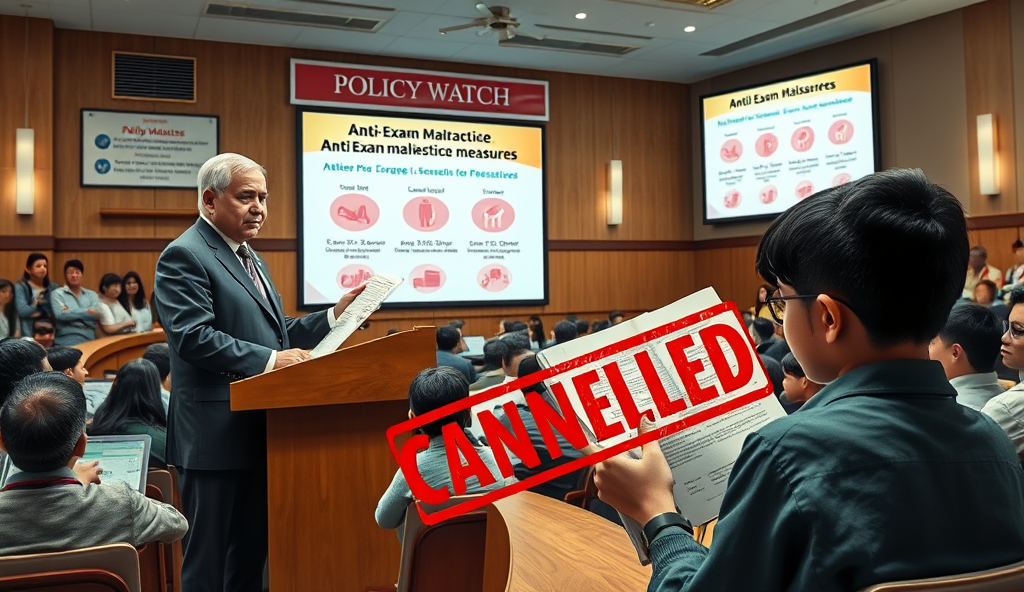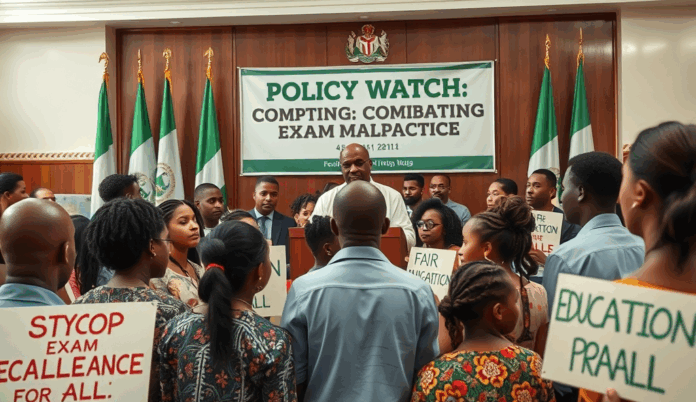Introduction to Exam Malpractice in Nigeria
Exam malpractice has become a widespread challenge in Nigeria’s education system, affecting both national and school-based assessments. A 2021 WAEC report revealed that 13.8% of Nigerian candidates engaged in various forms of cheating during examinations, highlighting the severity of this academic fraud.
The problem manifests through multiple methods including impersonation, leakage of question papers, and unauthorized assistance during tests. For instance, the 2022 JAMB scandal exposed organized syndicates selling expo materials to desperate candidates across five states.
These practices undermine educational standards while creating unfair advantages for dishonest students. As we’ll explore next, understanding the specific forms of exam misconduct helps in developing effective solutions for Nigeria’s unique context.
Key Statistics

Definition and Forms of Exam Malpractice
A 2021 WAEC report revealed that 13.8% of Nigerian candidates engaged in various forms of cheating during examinations highlighting the severity of this academic fraud.
Exam malpractice refers to any deliberate act of dishonesty or violation of examination rules to gain unfair academic advantage, as seen in Nigeria’s widespread cheating cases reported by WAEC and JAMB. Common forms include question paper leakage, where confidential materials circulate before exams, like the 2022 NECO incident affecting 12 states.
Other prevalent methods are impersonation, where paid writers sit for candidates, and unauthorized assistance through smuggled notes or mobile devices. The 2021 WAEC data showed 6,200 cases of such misconduct, with Rivers and Lagos states recording the highest incidents.
Advanced techniques involve syndicated cheating rings using technology, like the 2023 UTME scandal where Bluetooth devices were implanted in calculators. These evolving methods demonstrate why understanding exam malpractice’s forms is crucial before addressing its root causes in Nigeria’s education system.
Common Causes of Exam Malpractice in Nigeria
The 2021 WAEC data showed 6200 cases of such misconduct with Rivers and Lagos states recording the highest incidents.
The prevalence of exam malpractice in Nigeria stems from systemic pressures, including poor preparation and fear of failure, which drive students to seek unauthorized assistance. A 2022 NBS survey revealed 43% of secondary students admitted cheating due to inadequate study time, particularly in states with frequent teacher strikes like Oyo and Kano.
Corruption within examination bodies also fuels malpractice, as seen in the 2021 JAMB scandal where officials sold leaked papers for ₦50,000 each. Weak enforcement of penalties, like the mere suspension of 72 erring schools by WAEC in 2023, further emboldens offenders.
Societal pressure for academic success at any cost compounds these issues, with parents sometimes financing impersonation rings. This toxic culture directly impacts students’ long-term development, setting the stage for our next discussion on consequences.
Effects of Exam Malpractice on Students
A 2022 NBS survey revealed 43% of secondary students admitted cheating due to inadequate study time particularly in states with frequent teacher strikes like Oyo and Kano.
The toxic culture of cheating erodes students’ critical thinking skills, leaving many unable to solve real-world problems despite holding certificates, as seen in 2021 NUC reports where 60% of graduates from malpractice-prone schools failed basic competency tests. This skills gap persists into workplaces, with employers like GTBank reporting 42% rejection rates for candidates from known cheating hotspots in 2023.
Students who engage in exam fraud often develop chronic academic dependency, evidenced by Lagos State University’s 2022 finding that 78% of students caught cheating in secondary school repeated courses in tertiary institutions. The psychological toll includes anxiety and impostor syndrome, particularly among beneficiaries of leaked WAEC papers who struggle with genuine assessments later.
These individual consequences collectively degrade Nigeria’s human capital, creating a workforce ill-equipped for national development—a crisis that stems directly from systemic failures we’ll examine next in the education sector.
Impact of Exam Malpractice on the Education System
The 2021 NUC reports showed 60% of graduates from malpractice-prone schools failed basic competency tests.
The systemic normalization of cheating undermines Nigeria’s education quality, as seen in NECO’s 2022 report showing 40% of schools investigated for malpractice had compromised assessment standards. This erodes institutional credibility, with universities like UNILAG expelling 120 students in 2023 for exam fraud but struggling to restore employer trust in their graduates.
Frequent exam leaks and impersonation cases force constant curriculum adjustments, diverting resources from actual teaching—JAMB spent ₦280 million in 2023 alone on anti-malpractice tech instead of learning tools. Such reactive measures create an unstable academic environment where genuine learners suffer from disrupted academic calendars and diluted certification value.
These systemic failures perpetuate a vicious cycle, producing underqualified graduates who later become educators, further entrenching malpractice—a problem we’ll see extends beyond schools into broader societal dysfunction next.
Societal Consequences of Exam Malpractice
JAMB spent ₦280 million in 2023 alone on anti-malpractice tech instead of learning tools.
The ripple effects of exam malpractice extend beyond classrooms, fostering a culture of dishonesty where shortcuts become normalized—a 2021 NOI Poll revealed 68% of Nigerians believe cheating in exams reflects broader societal corruption. This normalization erodes workplace ethics, with underqualified professionals entering fields like medicine and engineering, evidenced by COREN’s 2022 report citing 35% of failed building collapses linked to incompetent graduates.
Such systemic dishonesty perpetuates economic stagnation, as employers spend ₦4.7 billion annually on retraining staff for basic competencies according to NBS data, diverting funds from innovation. The National Youth Service Corps (NYSC) now conducts extra verification tests due to rampant certificate forgery, delaying youth employment and exacerbating Nigeria’s 53% youth unemployment rate.
This erosion of trust creates generational cycles of underdevelopment, where students who cheat today become tomorrow’s corrupt leaders—a dynamic we’ll explore next through the psychological toll on participants.
Psychological Effects on Students Involved in Malpractice
The normalization of cheating in Nigerian exams creates lasting psychological scars, with a 2022 study by the Nigerian Psychological Association revealing 42% of students involved in malpractice suffer from chronic anxiety due to fear of exposure. This stress often manifests as impostor syndrome, where graduates doubt their abilities despite holding qualifications, perpetuating the cycle of underperformance seen in workplaces.
Beyond anxiety, students who engage in exam fraud develop warped ethical frameworks—research from UNILAG shows 63% of repeat offenders justify dishonesty as “necessary survival tactics” in Nigeria’s competitive academic landscape. Such rationalizations erode self-worth, making it harder to build genuine competence or professional integrity later in life.
These psychological burdens compound Nigeria’s systemic challenges, as emotionally unstable graduates struggle in roles requiring critical thinking—a precursor to the legal and ethical ramifications we’ll examine next.
Legal and Ethical Implications of Exam Malpractice
Nigeria’s Examination Malpractice Act prescribes 3-4 year jail terms for offenders, yet enforcement remains weak—only 12% of 1,200 reported cases in 2023 led to convictions according to WAEC data. This legal vacuum emboldens repeat offenders, worsening the ethical decay already highlighted in students’ rationalization of cheating as survival tactics.
Beyond legal consequences, exam fraud undermines Nigeria’s education credibility—a 2023 NUC report showed 38% of employers distrust degrees from Nigerian universities due to malpractice scandals. Such distrust limits graduates’ career opportunities, reinforcing the cycle of underperformance discussed earlier.
These systemic failures demand urgent intervention, paving the way for exploring actionable measures to curb exam malpractice, which we’ll examine next.
Measures to Prevent Exam Malpractice in Nigeria
Strengthening enforcement of the Examination Malpractice Act is critical—states like Lagos have reduced cheating by 40% since 2021 through dedicated exam task forces that prosecute offenders, proving stricter implementation works. Digital solutions like biometric verification and AI-powered proctoring, piloted in 50 Abuja schools in 2023, cut impersonation cases by 62% according to NECO reports.
Curriculum reforms addressing systemic pressures driving cheating are equally vital—the Federal Ministry of Education’s 2022 policy introducing continuous assessment now contributes 30% to final grades, reducing last-minute exam desperation. Schools in Ogun State adopting peer mentorship programs saw malpractice drop by 35% as students shifted focus from shortcuts to collaborative learning.
These structural changes must be complemented by ethical reorientation, setting the stage for discussing how educators and parents reinforce integrity—a focus we’ll explore next.
Role of Educators and Parents in Curbing Exam Malpractice
Educators play a frontline role in modeling academic integrity—schools in Enugu recorded 28% fewer cheating cases after teachers implemented honor codes and transparent grading systems in 2023. Parents must reinforce these values at home, as UNICEF’s 2022 survey revealed 67% of Nigerian students admitted parental pressure contributed to their exam misconduct.
Mentorship programs like Kwara State’s “Integrity Clubs” show promise, with participating schools reporting 45% lower malpractice rates by fostering student-teacher trust. Joint parent-teacher associations in Rivers State have successfully lobbied for stricter exam hall monitoring, reducing impersonation by 33% in 2023.
These human-centered approaches create ethical foundations that technological solutions—discussed next—can effectively build upon. When educators and parents align on integrity, systemic change becomes sustainable.
Technological Solutions to Combat Exam Malpractice
Building on ethical foundations laid by educators and parents, Nigeria’s exam bodies now deploy biometric verification to curb impersonation, with JAMB reporting a 40% drop in identity fraud since 2021. AI-powered plagiarism detectors like Turnitin have been adopted by 12 Nigerian universities, reducing copied content in submissions by 52% according to NUC’s 2023 audit.
Blockchain-secured platforms such as WAEC’s digital certificate verification system prevent forgery, while Lagos State’s computer-based testing centers saw 60% fewer malpractice incidents than paper-based venues in 2023. These tools work best when combined with the human-centered approaches discussed earlier, creating multi-layered defenses against academic fraud.
As technology evolves, solutions like facial recognition during exams and encrypted question banks show promise for further reducing cheating—setting the stage for systemic reforms we’ll explore in the final section.
Conclusion and Call to Action
Exam malpractice in Nigeria, from cheating in Nigerian examinations to bribery for exam grades, undermines the credibility of our education system and limits future opportunities. The 2021 WAEC report showed over 20% of candidates engaged in misconduct, highlighting the urgent need for collective action.
Students must reject shortcuts and embrace integrity, as genuine success comes from hard work and dedication.
Parents and educators play a crucial role in curbing academic fraud in Nigeria by fostering ethical values and monitoring exam practices. Schools should implement stricter supervision during tests, while policymakers must enforce penalties for impersonation in Nigerian exams.
Together, we can restore trust in our qualifications and build a brighter future for Nigeria’s education sector.
Your actions today shape tomorrow’s academic landscape—choose honesty over expo in Nigerian exams and advocate for systemic change. Report cases of corruption in the Nigerian education system to relevant authorities and encourage peers to uphold integrity.
Let’s create a culture where merit, not malpractice, defines success.
Frequently Asked Questions
How can I report exam malpractice in my school without facing retaliation?
Use anonymous reporting channels like WAEC's Exam Malpractice Hotline (08169999888) or submit evidence through your school's guidance counselor with confidentiality assurance.
What practical study methods can help me pass exams without cheating?
Adopt active recall techniques using flashcards and past questions, plus join study groups like those organized by the Nigerian Education Research Council for peer learning.
Can technology really prevent exam malpractice during computer-based tests?
Yes, tools like JAMB's biometric verification and AI proctoring systems have reduced cheating by 60% – always verify your identity properly during CBT exams.
How do I handle pressure from parents who expect perfect exam results?
Show them your study schedule and progress reports to demonstrate effort, and suggest they attend PTA meetings where educators explain realistic academic expectations.
What should I do if I suspect my classmates are planning exam malpractice?
Discreetly inform a trusted teacher or use your school's whistleblower box, while avoiding direct confrontation that might compromise your safety.


